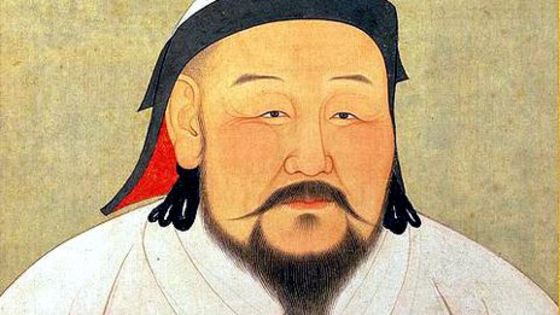Bagaimana satu clan kecil boleh menyatukan semua bangsa nomad Mongol. Yang tidak bercita-cita besar tetapi cabaran, tekanan dan keperluan survival telah membuatkan bangsa Mongol ini mencipta sebuah empayar (1206-1368) paling besar dalam sejarah dunia keluasaan 33 km2 dari Asia hingga ke Eropah sila klik sini.
Bagaimana pemimpin-pemimpin bangsa ini dari tidak kenal ilmu menjadi pemimpin yang berilmu dengan berfikiran terbuka menerima idea-idea baru dan toleran kepada berbagai kepercayaan agama. Pemimpin-pemimpin bangsa Mongol yang boleh menerima lain-lain bangsa berkhidmat dengan kerajaan berdasarkan meritokasi. Meritokrasi adalah satu sistem sosial yang menyanjung tinggi kebolehan dan keupayaan seseorang tanpa mengira pangkat,keturunan, kaum dan agama.
Bagaimana pemimpin-pemimpin hebat Mongol yang telah menjarah Empayar Islam seperti Khawarizmi dan Abasiyah yang telah dianggap oleh ulama pada masa itu sebagai "Kemurkaan Allah" yang boleh melenyapkan Islam akhirnya cucu cicit pemimpin Mongol ini telah mengembangkan Islam ke seluruh pelusuk Asia melalui Dar al-Islam Mongol.

Kublai Khan (1260-1294) cucu Gengis Khan adalah pengasas Yuan Dinasti menjadi Maharaja China pertama bukan dari bangsa Cina berjaya menyatupadukan seluruh negara China. Kublai Khan mempunyai 30 Pegawai Tertinggi pentadbiran berugama Islam.
8 Govenor dari 12 Govenor Daerah Pentadbiran Kublai Khan adalah orang Islam. Govenor-govenor ini telah mengembangkan Islam di China walau Islam telah tersebar ke China lebih awal lagi sejak kurun ke 7.
Walau Dinasti Yuan digantikan dengan Dinasti Ming, praktis mengambil Pegawai Tinggi kerajaan dari orang Islam diteruskan. Bahkan Maharaja dan keluarga Diraja dari Dinasti Ming ramai yang beragama Islam.
The Mongols also had a significant impact on Islam. The foundations of the Ottomans and Mughals, two great Islamic Empires in the early modern period, may be viewed as offshoots of the Mongol Empire. The Safavid Empire is also linked back to the Mongols, although more indirectly.
In addition, the Mongols conquered several Muslim states and ended the Abbasid Caliphate in Baghdad in 1258. The city of Baghdad was transformed from a major city into a provincial backwater, and the institution of the Caliph—which was meant to be the spiritual and, if possible, temporal leader of the Islamic world—ended as well.
Several rulers maintained the presence of a puppet Caliph afterwards, but the institution was not revived with any credible authority until the nineteenth century with the Ottoman Sultan serving as the Caliph.
Yet while Baghdad lost its standing as the center of learning and prestige in the Islamic World, a new center arose in Cairo. As the capital of the Mamluk Sultanate, and an enemy to the Ilkhanate, the Mamluk Sultans posed as the defenders of the religion. Since 1260, then, Cairo has remained the most influential center of learning and culture in the Islamic world.
Even while this was occurring, the Mongols gradually converted to Islam. While wholesale conversion did not ensue, and at times, non-Islamic rulers came to the throne, the process gradually continued until all of the Mongolian-Turkic groups who dominated the Mongol states converted to Islam, thus extending it beyond the sedentary regions of Western and Central Asia and into steppe regions where Islam had previously had little influence.
Through the syncretic nature of Sufism, the Dar al-Islam grew under the Mongols—an interesting reversal of the initial Muslim view that when "The Scourge of God" first appeared Islam was at an end.
Meanwhile, they hastened the decentralization of religious authority in the Islamic world by ending the 'Abbasid Caliphate. The rise of Sufism and the Mongols' own use of Islam for political purposes as well as sincere conversion, led to the expansion of Islam throughout much of Asia.


2 comments:
bape
moncler
pandora jewelry
kenzo
pg 4
moncler
curry 6
jordan shoes
golden goose
golden goose
Orang-orang ini makan wang Kuil dan wang masyarakat, mereka akan menderita selama-lamanya dalam kehidupan ini dan kehidupan yang akan datang tetapi mereka tidak pernah malu kepada Tuhan dan orang lain.
Datuk Yip Kum Fook dan adik iparnya(Simon Low Kok Meng) menghina AGAMA BUDDHA, kami harap orang ramai (penganut) akan boikot segera, kemudian mereka akan berpindah dari kawasan Kepong
From Mr. Pang, taman daya, kepong, kuala lumpur
Post a Comment